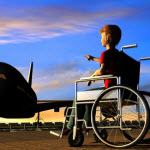Reduced Mobility Air Travel Report August 2012
- Written by Roberto Castiglioni
 Testing airport and airline services is of the essence to determine what works and what does not in the reduced mobility assistance sector.
Testing airport and airline services is of the essence to determine what works and what does not in the reduced mobility assistance sector.
The late summer bank holiday came as the prime opportunity to review services at London Heathrow airport, Zurich Kloten and Palma de Mallorca airport.
Request for wheelchair assistance was made and confirmed at the time of booking, ten days prior to departure. Airlines normally require a preadvise of minimum 48 hours to allow them to process special assistance requests.
Relatively simple for the passenger with reduced mobility, the process of requesting assistance presents far reaching complexities. Unlike in the United States where air carriers are sole responsible to procure and manage PRM assistance, European legislation splits duties between airports and airlines.
The airline receives information from the passenger, which is then passed on to all parties involved (airports). The latter bears the burden of providing most of the assistance services to passengers reduced mobility.
The journey through EU airports began the morning of August 24th. We always travel with a personal wheelchair to ensure maximum freedom throughout the journey and upon arriving at the destination.
The check in process at the Swiss International Airlines counter was fast and professional. Knowing the high level of assistance provided by Zurich Kloten airport, we asked for our wheelchair to be delivered to us upon arriving at our final destination, Palma de Mallorca.
We made our way to the gate at London Heathrow, and pre boarded the short flight to Zurich. Upon arriving at Switzerland’s main airport, we waited for all other passengers to deplane before making our way out of the airplane.
Unexpectedly, our prebooked assistance was nowhere to be found! However, because of another blunder of Swiss, our own wheelchair had been returned to the aircraft. The second mistake, returning our wheelchair despite our original choice of having it back at the final destination mitigated the lack of assistance from Zurich airport.
A short time after deplaning from the first flight, our second and final flight was ready to embark. Pre-boarding was not offered; therefore we waited for other passengers to embark before making our way onto the aircraft.
The flight to the Balearic island of Mallorca was pleasant. An unwelcome surprise awaited upon deplaning at Palma de Mallorca airport. Just like in Zurich, airport assistance was nowhere to be found. Then again, having a personal wheelchair proved to be essential. We checked with the airline customer service and they confirmed requests for assistance in Zurich and Palma had been sent to PRM services providers.
On August 28th we started the journey back. At Palma de Mallorca we declined assistance in order to better enjoy the freedom allowed by travelling with your own wheelchair. There was no preboarding announcement made, but we were still allowed to board among the first group of passengers.
Upon arriving in Zurich Kloten we were met by assistance that quickly wheeled us to the connecting flight to London Heathrow airport. Once again, there was no preboarding announcement so we had to board among all other passengers. In fact, a couple of exceptionally rude men pushed us to the side as we were about to enter the airplane. Surprisingly, the flight purser standing right there did not say anything.
For a change, we had a unusually enjoyable experience upon arriving at London Heathrow. After having to register six complaints with the Civil Aviation Authority, both the airline handling agent and Heathrow assistance performed their duty as expected.
The picture emerging from this report is not too enthusiastic. Travelling by air with your own wheelchair, even if just as backup, is once again proven essential. Communication between airlines and airport service providers apparently remains the weakest link of the entire process. The pressure on handling agents to ensure fast turnarounds, the time between the plane landing and departing again, clearly plays a determining role when preboarding of vulnerable passengers is not offered. Airport assistance is still a hit and miss, even at superefficient airports like Zurich Kloten.
The above must not stop passengers with reduced mobility. Reduced Mobility Rights focus remains on the need to remind carriers and airport managing companies of those areas of PRM assistance services that have room for improvement, and therefore require their immediate attention.
About the author
Founder and Editor-in-Chief of Reduced Mobility Rights, Roberto Castiglioni has extensive knowledge of PRM regulations and handling procedures, along with first-hand experience as a travelling companion and carer of a passenger with reduced mobility.
Roberto is a member of ESAAG. Chaired by the Hon. David Blunkett MP, the Easyjet Special Assistance Advisory Group, ESAAG, provides Easyjet with strategic guidance and practical advice on the evolving needs of passengers requiring special assistance. Easyjet is the largest airline in the United Kingdom by number of passengers carried.










